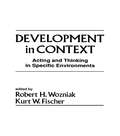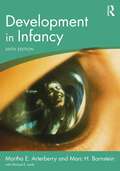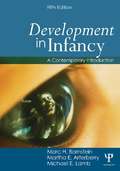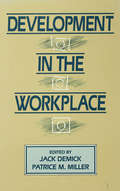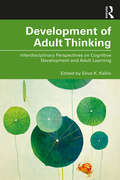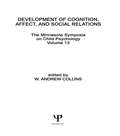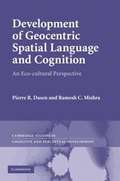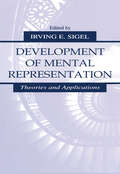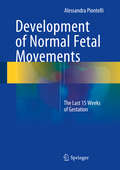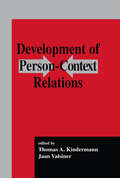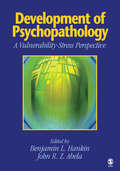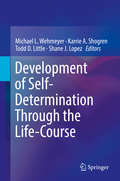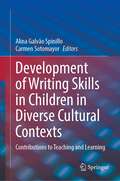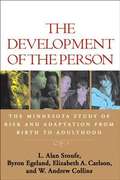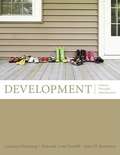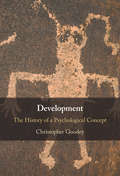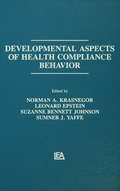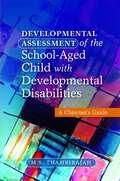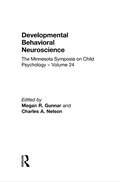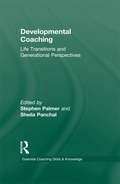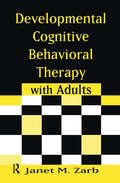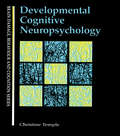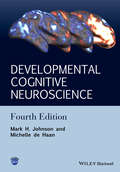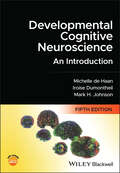- Table View
- List View
Development in Context: Acting and Thinking in Specific Environments (Jean Piaget Symposia Series)
by Kurt W. Fischer Robert H. WozniakIn this volume leading developmentalists address the question of how children's thinking develops in context by drawing on the theories of Vygotsky, Gibson, and Piaget. Analyses of the ecology and the dynamics of behavior have become popular, emphasizing the particulars of people acting in specific environments and the many complex factors of human body and mind that contribute to action and thought. This volume brings together many of the current efforts to deal with development in this richly ecological, dynamic way. The research reported demonstrates that recent years have produced major shifts in approach. Activities are studied as they naturally occur in everyday contexts. Children's active construction of the world around them is treated as fundamentally social in nature, occurring in families, with peers, and in cultures. Behavior is studied not as something disembodied but within a rich matrix of body, emotion, belief, value, and physical world. Behavior is analyzed as changing dynamically, not only over seconds and minutes, but over hours, days, and years.
Development in Infancy
by Marc H. Bornstein Martha E. ArterberryDevelopment in Infancy reflects many new discoveries that have transformed our understanding of infants and their place in human development, with an emphasis on 21st century research. Organized topically, the book covers physical, perceptual, cognitive, language, emotional, and social development, in addition to describing theories of development, contexts of development, research methods, and implications of research in infancy for social policies and interventions. Key issues in infancy studies—those having to do with how nature and nurture transact and with interrelations among diverse domains of development—are woven throughout the book. The text also emphasizes infancy as a unique stage of the life cycle. The new edition features new key point summaries at the end of most sections, definitions of boldfaced terms in the margins, and invitations to engage in retrieval practice at the end of each chapter. Each chapter also features Set for Life? text boxes that explore events and developments in infancy that reverberate in later development. This edition also features a new full-color design and over 100 figures, tables, and photos. The text is written in a clear and engaging style and is approachable for students with varying academic backgrounds and experiences. Development in Infancy is the authoritative text for undergraduate and graduate courses on infant development or early child development taught in departments of psychology, child development, education, nursing, and social work. The text is supported by Support Material that features a robust set of instructor and student resources.
Development in Infancy: A Contemporary Introduction
by Marc H. Bornstein Michael E. Lamb Martha E. ArterberryThis topically-organized text provides a comprehensive overview of infant development with a strong theoretical and research base. Readers gain a clear understanding of infant development and issues that will be the focus of significant advances in infancy studies in the future. The new fifth edition reflects the enormous changes in the field that have occurred over the past decade. The thoroughly revised chapters emphasize work from the 21st century, although classic references are retained, and explore contextual, methodological, neurological, physical, perceptual, cognitive, communicative, emotional, and social facets of infant development. The fifth edition features a more accessible style and enhanced pedagogical and teaching resource program. This extensively revised edition features a number of changes: * The fifth edition adds a new co-author, Martha Arterberry, who brings additional teaching and research skills to the existing author team. * An enhanced pedagogical program features orienting questions at the beginning of each chapter and boldfaced key terms listed at the end of the chapter and defined in the glossary to help facilitate understanding and learning.* Two new boxes in each chapter - Science in Translation illustrate applied issues and Set for Life highlight the significance of infancy for later development.* Increased emphasis on practical applications and social policy.* More graphs, tables, and photos that explain important concepts and findings.* Literature reviews are thoroughly updated and reflect contemporary research.* All new teaching web resources -- Instructors will find Power Points, electronic versions of the text figures, and a test bank, and students will find hyperlinked references and electronic versions of the key concepts and the definitions. Intended for beginning graduate or advanced undergraduate courses on infant (and toddler) development or infancy or early child development taught in departments of psychology, human development & family studies, education, nursing, social work, and anthropology, this book also appeals to social service providers, policy makers, and clergy who work with community institutions. Prerequisites include introductory courses on child development and general psychology.
Development in the Workplace
by Jack Demick Patrice M. MillerOriginally presented at the Sixth Adult Development Symposium, the papers in this volume examine possible relationships between the fields of organizational and (adult) developmental psychology with particular emphasis given to the grand developmental theories of Lawrence Kohlberg, Jean Piaget, Lev Vygotsky, Heinz Werner, and their descendants. On the most general level, the papers on development in the workplace are organized on the basis of the authors' chosen units of analysis -- the individual, the dyad and group, and the organizational culture. The editors conclude by uncovering similarities and differences among the contributors' theoretical approaches to development in the workplace and their own. From a recent extension of Werner's organismic-developmental theory, they focus their suggestions for future research on such issues as: * unit of analysis * the holistic and systemic nature of human behavior and experience * broader conceptualizations of the person, of the environment, and of development * the need for methodological eclecticism * the complimentarity of basic and applied research. Through this lens, they shed light on underlying reasons why the majority of authors have focused on the individual worker as a unit of analysis and then propose that future researchers more broadly define the basic concept of development in the workplace.
Development of Adult Thinking: Interdisciplinary Perspectives on Cognitive Development and Adult Learning
by Eeva K. KallioDevelopment of Adult Thinking is a timely synthesis and evaluation of the current knowledge and emerging issues relating to adult cognitive development and learning. Focusing on psychological and educational cutting-edge research as well as giving an overview of the key theorists such as Piaget and Kohlberg, Kallio and the team of expert contributors offer a holistic view on the development of adult thinking, representing perspectives from developmental, moral, and social psychology, as well as education and philosophy. These topics are divided into three sections: Adult cognitive and moral development, Perspectives of adult learning, and Open questions and new approaches, offering introduction, analysis, and directions for future research. This text is essential reading for students and researchers in developmental psychology and related courses as well as adult educators and teachers working in adult education.
Development of Cognition, Affect, and Social Relations: The Minnesota Symposia on Child Psychology, Volume 13 (Minnesota Symposia on Child Psychology Series)
by W. Andrew CollinsFirst published in 1982. Routledge is an imprint of Taylor & Francis, an informa company.
Development of Geocentric Spatial Language and Cognition
by Pierre R. Dasen Ramesh C. MishraEgocentric spatial language uses coordinates in relation to our body to talk about small-scale space ('put the knife on the right of the plate and the fork on the left'), while geocentric spatial language uses geographic coordinates ('put the knife to the east, and the fork to the west'). How do children learn to use geocentric language? And why do geocentric spatial references sound strange in English when they are standard practice in other languages? This book studies child development in Bali, India, Nepal, and Switzerland and explores how children learn to use a geocentric frame both when speaking and performing non-verbal cognitive tasks (such as remembering locations and directions). The authors examine how these skills develop with age, look at the socio-cultural contexts in which the learning takes place, and explore the ecological, cultural, social, and linguistic conditions that favour the use of a geocentric frame of reference.
Development of Mental Representation: Theories and Applications
by Irving E. SigelThere is a general and extensive literature in the development of representational thought and symbolic processes because of its centrality in human evolution. However, the umbrella of science and its method does not necessarily lead to a coherent conceptual model, or agreements among scholars. These basic differences among various disciplines have led to the creation of new and exciting realms of research. This book considers how representational or symbolic thought develops for children's use in a wide array of these circumstances.
Development of Normal Fetal Movements
by Alessandra PiontelliIn the later stages of gestation, fetal functions undergo increasing change and development, preparing the fetus for the transition to its postnatal environment. Rapid maturation is witnessed in breathing, swallowing, sensory functions, sleep, and many other processes, with corresponding behavioral changes. By 35 to 40 weeks of gestation, fetuses are capable of living ex utero without support, but it is increasingly appreciated that even infants born at between 35 and 36 weeks can suffer long-term consequences. This book, which complements the author's previous volume on development of normal fetal movements during the first 25 weeks of gestation, discusses in detail the full range of behavioral phenomena observed during the final 15 weeks of gestation, with careful analysis of their mutual relationships. A key feature is the outstanding photographic material, difficult to obtain at this late stage, and the instructive graphs that are also included. The information provided will alert clinicians to deviations from the norm and to physiologic phenomena that can turn pathologic in infants born prematurely.
Development of Person-context Relations
by Jaan Valsiner Thomas A. KindermannnTraditionally, developmental psychology has its focus on individuals. Developmentalists aim to describe regularities in individuals' change and development across time, to explain the processes and mechanisms that are involved in producing change and regularity, and eventually, to design strategies for optimization and modification of developmental pathways. Although the role of contexts has always been of central concern for these purposes, it is nevertheless quite surprising to note that compared to the effort devoted to individuals, relatively little attention has been paid to the study of the nature and organization of their contexts. This volume is an exploration of the idea that how we describe and explain human development will be closely tied to our understanding of what contexts are, how individuals and contexts become influential for one another, what contexts do to and with individuals, and how contexts and their influences change themselves across time. A major theme is whether the traditional dichotomy between individuals and their contexts may be artificial, perhaps culturally biased, and after psychologists have adhered to it for about a century, may have become an impediment to increasing our understanding of developmental processes. With this volume, the editors contribute a serious consideration of development and systematic change to emerging models of person-context relations, and provide suggestions about how it may be possible to incorporate these notions in developmental research and theorizing.
Development of Psychopathology: A Vulnerability-Stress Perspective
by Benjamin L. Hankin Dr John R. AbelaEdited by Benjamin L. Hankin and John R. Z. Abela, Development of Psychopathology: A Vulnerability-Stress Perspective brings together the foremost experts conducting groundbreaking research into the major factors shaping psychopathological disorders across the lifespan in order to review and integrate the theoretical and empirical literature in this field. The volume editors build upon two important and established research and clinical traditions: developmental psychopathology frameworks and vulnerability-stress models of psychological disorders.
Development of Self-Determination Through the Life-Course
by Michael L. Wehmeyer Karrie A. Shogren Shane J. Lopez Todd D. LittleThis volume examines the developmental aspects of the general psychological construct of self-determination. The term refers to self- (vs. other-) caused action--to people acting volitionally--as based on their own will. Research conducted in the fields of psychology and education shows the importance of self-determination to adolescent development and positive adult outcomes. The first part of this volume presents an overview of theories and historical antecedents of the construct. It looks at the role of self-determination in major theories of human agentic behavior and of adolescent development and individuation. The second part of the volume examines the developmental origins and the trajectory of self-determination in childhood, adolescence, and adulthood, and looks as aging aspects. The next part presents studies on the evolutionary aspects, individual differences and healthy psychological development. The last part of the book covers the development of causal and agentic capability.
Development of Shyness and Social Withdrawal
by Kenneth Rubin Robert CoplanWhile both positive and negative peer interactions have long been a focus of scientific interest, much less attention has been given to children who tend to refrain from interacting with peers. This volume brings together leading authorities to review progress in understanding the development, causes, and consequences of shyness and social withdrawal. Compelling topics include The interplay of biological, psychological, family, and interpersonal processes in shyness and social withdrawal from infancy through adolescence. The impact on peer relationships and academic performance. Links among shyness, social withdrawal, and social anxiety disorder. The positive side of unsociability when to 'leave children alone. 'Implications for clinical practice and educational interventions.
Development of Writing Skills in Children in Diverse Cultural Contexts: Contributions to Teaching and Learning
by Alina Galvão Spinillo Carmen SotomayorThis book brings together multiple theoretical perspectives and disciplinary approaches to study the acquisition and development of written language by children as well as the implications for teaching and learning of writing practices in a variety of languages and cultural contexts. Chapters in this contributed volume present both theoretical contributions and results of research carried out with students and teachers from 11 countries (Belgium, Brazil, Chile, Israel, Italy, Mexico, the Netherlands, Portugal, Spain, UK and USA) who speak seven different languages: Portuguese, Spanish, English, Italian, French, Dutch and Hebrew. By bringing together research developed in diverse cultural contexts it enriches the debates in the interdisciplinary field of writing studies by analyzing a wide range of topics at the interface between research and educational implications for the teaching and learning of writing by children. The book consists of five parts, each one addressing a specific set of topics. Part I presents studies on topics related to written language representation systems (phonological and morphological awareness) and on the relationship between grammar and the quality of texts of different genres. Part II includes studies related to compositional processes of writing texts, and the factors involved in these processes. Part III focuses on the difficulties faced by students during the acquisition and development of writing. Part IV is dedicated to chapters that discuss and compare writing practices in different social environments. Finally, chapters in part V deal with teaching and learning of writing in the school setting. Development of Writing Skills in Children in Diverse Cultural Contexts: Contributions to Teaching and Learning will be of interest to researchers and students in the fields of psychology, education and linguistics, as well as to other social scientists in the broader interdisciplinary field of writing studies.
Development of the Person
by Byron Egeland L. Alan SroufeThe definitive work on a groundbreaking study, this essential volume provides a coherent picture of the complexity of development from birth to adulthood. Explicated are both the methodology of the Minnesota study and its far-reaching contributions to understanding how we become who we are. The book marshals a vast body of data on the ways in which individuals' strengths and vulnerabilities are shaped by myriad influences, including early experiences, family and peer relationships throughout childhood and adolescence, variations in child characteristics and abilities, and socioeconomic conditions. Implications for clinical intervention and prevention are also addressed. Rigorously documented and clearly presented, the study's findings elucidate the twists and turns of individual pathways, illustrating as never before the ongoing interplay between developing children and their environments.
Development: Infancy Through Adolescence
by Laurence Steinberg Deborah Vandell Marc BornsteinThe combined features that distinguish this text from other titles can be summarized with an acronym: CARE C utting edge research A pplied developmental science R eadability E ssential knowledge Written by respected child development experts, this authoritative and chronologically organized text presents an integrated perspective on child development. The authors write in an engaging manner, synthesizing biological, social, cultural, and socioeconomic influences as opposed to organizing content around developmental themes. Incorporation of classic and cutting-edge research includes extensive coverage of new research in developmental neuroscience, which has transformed the study of child development by introducing brain maturation. At the same time, the text emphasizes the application of developmental psychology to real world problems, focusing on the ways in which knowledge of child development can inform social policy and practice in the fields of child care, education, mental health, and family life. Reflecting the authors' combined expertise, the broad array of real-life examples resonate with students from different backgrounds and fields of study, and with different occupational goals in mind. With its distinctive and effective combination of cutting-edge research, applications, readability, and essential knowledge, this text helps students understand and appreciate what today's scientists are discovering about child development, how they study the process, and how this knowledge can be used to improve the lives of infants, children, and adolescents around the world.
Development: The History of a Psychological Concept
by Christopher GoodeyThis book details the history of the idea of psychological development over the past two millennia. The developmental idea played a major part in the shift from religious ways of explaining human nature to secular, modern ones. In this shift, the 'elect' (chosen by God) became the 'normal' and grace was replaced by cognitive ability as the essentially human quality. A theory of psychological development was derived from theories of bodily development, leading scholars describe human beings as passing through necessary 'stages of development' over the lifespan. By exploring the historical and religious roots of modern psychological concepts and theories, this book demonstrates that history is a method for standing outside psychology and thereby evaluating its fundamental premises. It will spark new interest in the history, sociology and philosophy of the mind sciences, as well as in the rights of children and developmentally disabled people.
Developmental Aspects of Health Compliance Behavior
by Norman A. Krasnegor Leonard Epstein Suzanne Bennett Johnson Sumner J. YaffeWhile in the late 1970s and early 1980s health compliance research on adults represented a vigorous field of study, a marked decline of interest on the topic set in during the last part of the 1980s. By contrast, research on health compliance involving pediatric populations was less popular during the same period; however, interest in this topic -- as evidenced by the contributions to this volume -- is on the increase. Four main themes -- relating to theory, measurement, prevention, and intervention -- emerge and are interwoven among the chapters. These themes help to bind and unify the volume into a conceptual whole because although the sections are divided along thematic lines, contributors often include elements of some or all of the themes in their chapters. This state of affairs reflects the interdependence of these thematic issues and suggests how important they are for the state of the art.
Developmental Assessment of the School-Aged Child with Developmental Disabilities
by M. S. ThambirajahChildren and adolescents with emotional and behavioural problems who are referred to mental health services for assessment often have undiagnosed mild learning disabilities, and this guide is written for clinicians involved in making such assessments. It provides full guidance on common developmental disorders and their assessment, focusing on mild to moderate disabilities in the school-aged child. It covers intellectual disabilities, dyslexia, dyscalculia (mathematical disability), autism spectrum disorders, speech and language impairment, developmental coordination disorder, and emotional and personality development. Each chapter includes an account of normal development, including developmental milestones, an overview of the disorder, and its clinical assessment. This important professional guide will be invaluable for all child health and mental health professionals and trainees, including paediatricians, psychiatrists, mental health workers, clinical psychologists and educational psychologists.
Developmental Behavioral Neuroscience: The Minnesota Symposia on Child Psychology, Volume 24 (Minnesota Symposia on Child Psychology Series #Vol. 24)
by Megan R. Gunnar Charles A. NelsonThis volume provides an introduction to current research on the relation between brain development and the development of cognitive, linguistic, motor, and emotional behavior. At least two audiences will benefit from this book: psychologists interested in brain development, and neuroscientists interested in behavioral development. Although each chapter is content-oriented, the volume as a whole provides a well integrated summary of the latest findings from developmental behavioral neuroscience.
Developmental Coaching: Life Transitions and Generational Perspectives (Essential Coaching Skills and Knowledge)
by Stephen Palmer Sheila PanchalDevelopmental Coaching explores many of the common transition points we experience throughout life, including teenage transitions, becoming a parent, mid-life and retirement. The book sets these transitions in their social context and reviews them in the light of generational factors. The book is introduced with key psychological concepts from areas such as lifespan development and positive psychology, in addition to insights from other disciplines, including management theory and sociology. The main topics of discussion are: coaching tools and techniques broader societal and generational trends how coaching can help individuals to realise positive growth. With case studies throughout, Developmental Coaching offers an essential resource for practising coaches, coaching psychologists, counsellors and other professionals who wish to further their knowledge of the developmental aspects of coaching and dealing with life transitions.
Developmental Cognitive Behavioral Therapy with Adults
by Janet M. ZarbDevelopmental Cognitive Behavioral Therapy with Adults outlines a new cognitive approach that combines existing CBT theory and strategies with a lifespan developmental psychopathology perspective. The major focus is on the relationship between mastery of normative psycho-social developmental tasks and mental health. Primary targets for therapy are maladaptive developmental pathways that have significantly disrupted the client’s ability to cope with normal adult tasks and challenges. The book builds on standard cognitive therapy models and techniques, while providing further assessment and therapy strategies to address patterns interfering with resolution of normative adult tasks and roles. It introduces several new developmental assessment and therapy strategies, designed to address client difficulties with normal adult developmental tasks and to identify longstanding maladaptive pathways maintaining these difficulties. The book offers a variety of psycho-social developmental task difficulties in occupational, social, and family functioning. The clinical examples provide a deeper understanding of pathways to competence, as well as pathways to deviance, and the contrast between normal and atypical processes as they emerge at different developmental periods.
Developmental Cognitive Neuropsychology (Brain, Behaviour and Cognition)
by Christine TempleHow independent are different cognitive skills during development? Is the modularity seen in the studies of adult neuropsychology disorders mirrored by modularity in development? Are developmental neuropsychological disorders explicable against cognitive models? What restrictions are there to developmental plasticity? How many routes are there to competence? Is there a single developmental pathway? What do disorders of cognitive development tell us about normal developmental processes? These are some of the questions addressed by this text.In certain cognitive domains, such as the analysis of reading and spelling disorders, the field is well developed, with extensive studies of the development of dyslexias and dysgraphias. In other areas, such as the analysis of perceptual spatial disorders, pertinant studies are beginning, as in the analysis of developmental face recognition disorders, and the exploration of spatial disorders of Williams' syndrome. In these areas, interesting routes for future inquiry are also evident. The text of this book is organized around seven key cognitive areas, within which the developmental disorders are addressed in turn: language, memory, perception, reading, spelling, arithmetic and executive skills. The first three of this list may be considered the core areas of cognition; the second three involve specific cultural transmission in their acquisition; and the third, concerns higher order processes. The major emphasis of the text is upon developmental rather than acquired disorders. Throughout, case studies are used to convey an impression of the cases themselves, and to illustrate how dissociations in performance are displayed.
Developmental Cognitive Neuroscience
by Michelle De Haan Mark H. JohnsonThe third edition of Developmental Cognitive Neuroscience presents a thorough updating and enhancement of the classic text that introduced the rapidly expanding field of developmental cognitive neuroscience. Includes the addition of two new chapters that provide further introductory material on new methodologies and the application of genetic methods in cognitive developmentIncludes several key discussion points at the end of each chapterFeatures a greater focus on mid-childhood and adolescence, to complement the previous edition?s emphasis on early childhoodBrings the science closer to real-world applications via a greater focus on fieldworkIncludes a greater emphasis on structural and functional brain imaging
Developmental Cognitive Neuroscience: An Introduction
by Mark H. Johnson Iroise Dumontheil Michelle D. de HaanLandmark text focusing on the development of brain and behavior during infancy, childhood, and adolescence Developmental Cognitive Neuroscience provides an accessible introduction to the main methods, theories, and empirical findings of developmental cognitive neuroscience. The focus is on human development from in utero to early adulthood, but key comparative work is also included. This new edition covers research in clinical/medical populations, educational applications and major advancements in methods and analysis, in particular with increasing longitudinal research focusing on understanding the mechanisms of cognitive development. It also contains a new chapter on global and cross-cultural perspectives outlining how developmental cognitive neuroscience has been applied in different settings and how techniques can be successfully adapted. The text features a variety of student-friendly features such as chapter-end discussion, applications of basic research, and introductions to key experimental methods. An accompanying related resource website for students and educators that includes a test bank of multiple choice questions is also provided. Other sample topics covered in Developmental Cognitive Neuroscience include: Biology of change, methods, and populations, from gene to brain, building a brain, and vision, orienting, and attention Perceiving and acting in a world of objects, learning, and long-term memory, language, and prefrontal cortex, working memory, and decision-making Perceiving and acting in the social world, educational neuroscience, interactive specialization, and integrating development cognitive neuroscience Mid-childhood and adolescent development, social cognition and neuroimaging, and broader cognitive neuroscience approaches and theory With expansive yet accessible coverage of the subject, Developmental Cognitive Neuroscience is an ideal resourcefor upper level undergraduate and early postgraduate readers. The text will further appeal to professionals in fields that have adopted developmental cognitive neuroscience approaches, such as education, clinical psychology, pediatric medicine and global health.
